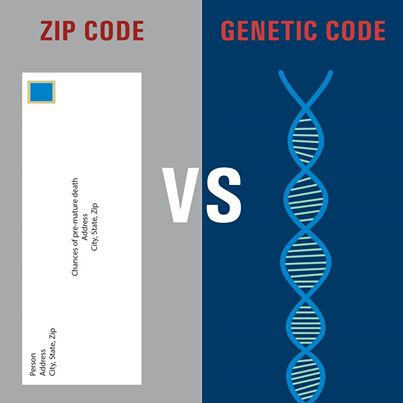Health Inequality (Hint: It Doesn’t Have Very Much to Do With Medical Care)
Depending on where you live in Cook County, your prospects for reaching a ripe old age vary dramatically — from about 65 years in the poorest sections of Austin on Chicago’s West Side to 85 or so in parts of neighboring Belmont Cragin. Living a longer, healthier life goes with owning your home, having a college education and earning a high income…
 How long and how well you live have more to do with your ZIP code than with your DNA code — or your medical care. If you live in a neighborhood where the median household income is less than $25,000 a year, your life expectancy is about 14 years shorter than that of someone in a neighborhood where the median annual household income is more than $53,000…
How long and how well you live have more to do with your ZIP code than with your DNA code — or your medical care. If you live in a neighborhood where the median household income is less than $25,000 a year, your life expectancy is about 14 years shorter than that of someone in a neighborhood where the median annual household income is more than $53,000…
We are co-chairs of the Robert Wood Johnson Foundation Commission to Build a Healthier America, which releases its report [today]…The commission’s recommendations for improving our nation’s health have little to do with the health care system. They highlight three priorities: expanding access to high-quality early childhood development services; revitalizing low-income neighborhoods; and broadening the mission of doctors, nurses and other health care providers to go beyond medical treatment and help address nonmedical factors affecting health.
Alice Rivlin and Mark McClellan in the Chicago Tribune.


This is the main reasons why the healthcare system in this country needs to be changed.
“To what?”, that is the question.
It will basically take an overhaul of all the Obama-led policies for a real change that is productive.
A repeal would be better, but that’s impossible.
Correlation vs causation
A thousand times, this.
No one really knows where the horse and cart go today. Everyone claims a different place.
It’s politically expedient to their other motives to claim causation.
Correct. It is not the zip code, is everything that derives from it. Better education, more opportunities, higher living standards and an easier access to medical services. I think that the best part of the article is the authors’ suggestions of what to do: better childhood services, revitalization of low income neighborhoods and access to medical services to those who reside in remote areas. Those are things that should be done first in order to have a good health care system.
Shit, Adam beats me to it, then Kevin beats me to congratulating Adam.
This is the classic case of it. A study finds children from homes with new appliances tend to do better in school. Solution: Buy appliances for homes with struggling students?
The same factors that drive someone to succeed in life: ambition, will power, discipline, also affect how people care for their own bodies. Some people just aren’t motivated to better their situation in life, be that health wise or financially (outside of buying a lottery ticket).
Of course living conditions and areas affect life expectancy, from living conditions to crime rates and negative influences within the neighborhoods.
Well you can definitely expect a longer life expectancy living next to Ward and June Cleaver as opposed to living in the projects of Los Angeles.
“They highlight three priorities: expanding access to high-quality early childhood development services; revitalizing low-income neighborhoods; and broadening the mission of doctors, nurses and other health care providers to go beyond medical treatment and help address nonmedical factors affecting health.”
These are really the only ways that they can target and rehabilitate these certain hazardous neighborhoods.
All of this is easier said than done. Just look at the sudden abandonment of Detroit.
But there are some neighborhoods that don’t give its inhabitants their basic needs. Those are the ones that need to be fixed first. How can we hope for a health care system that covers every American when there are some that can hardly survive their everyday life? If we do not target low income neighborhoods how can we improve the status quo?
Thanks John!
If you have worked with the poor, you know that their dental health is terrible. I don’t think this has to do directly with income, job type, neighborhood, etc. It mostly has to do with food choices. I suspect that most of the 14 year difference in life span also has to do with these same food choices. I would also suspect that focusing on food as the variable would have the largest impact on health, much more than any of the “solutions” mentioned by the authors.
Men in Glasgow’s east end have life expectancy of 54
MEN born in Glasgow’s deprived east end will die nine years before men born in India.
No, the real solution to the problems of early childhood deprivation and poverty, lousy education, lack of health care deliver to the poor and other problems is to prohibit breeding among people who aren’t licensed to breed–those who have no money, no job, no prospects, no future, no brains, no education, no drive, no good habits, and so on.
Why would we entrust child-rearing to folks whom we wouldn’t allow to cut hair or drive a taxi without certification?